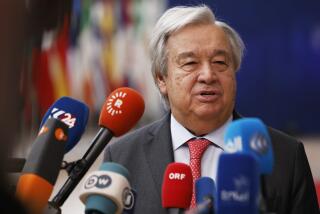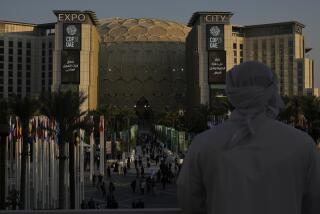First Europe-Africa Summit Begins
CAIRO — Responding to a sense that Africa has been neglected, the European Union on Monday joined the Organization of African Unity for a summit meeting at which Africans asked for reduction of their crushing $350-billion debt and Europeans called for better government and more democracy.
The gathering of officials from 52 African and 15 European countries, the first such joint summit, was opened by Egyptian President Hosni Mubarak, who stressed that Africa was looking for cooperation rather than handouts.
“What we aspire for through this historic event in Cairo today is not an attempt to increase aid but a desire to develop partnership . . . and to achieve a comprehensive renaissance,” Mubarak said.
Portuguese Prime Minister Antonio Guterres, whose country currently holds the rotating presidency of the EU, said Europe is willing to lend a hand and warned that “Africa must not be marginalized.” He said the conference will “help us set a plan of action for the future.”
But he tweaked African leaders for their continent’s wars and its spotty record on equality and political freedoms.
“We believe the continent should have peace, democracy and respect for human rights, and these principles should permeate everywhere, because democracy is not an advantage that only rich people should have but a right for everybody,” Guterres said.
The two-day meeting is taking place inside a cocoon of heavy security. But the mood was relaxed in the halls of the Cairo Conference Center, with both Europeans and Africans viewing the summit as a turning point that will lead to more respect elsewhere for Africa’s concerns.
“It is more than important, it is determinative” for Africa to have such direct political contacts with the EU, said Assih Remi, editor in chief of Togo’s national daily, Togo-Presse.
European powers colonized and exploited Africa for much of the 19th and 20th centuries. Among other things, they laid out arbitrary national borders that many Africans consider a cause of the continent’s chronic instability.
Africans say the legacy of the colonial system, which reserved education for small elites and discouraged the development of industry, is the main reason Africa lags behind the other continents in spite of its rich natural resources.
According to the United Nations, 33 of the world’s 48 poorest countries are in Africa.
Algerian President Abdelaziz Bouteflika said that while the debt burden on African countries has been mounting, foreign investment in the continent has been dwindling. Direct foreign investment in Africa last year was less than 1% of all foreign investment worldwide, he said.
Several of the opening speeches Monday dealt with the debt issue. The secretary-general of the OAU, Salim Ahmed Salim of Tanzania, called for a “faster, quicker and broader” debt relief process.
It appeared that the Africans were getting a sympathetic hearing but no concrete action. EU leaders said in advance that the Cairo summit was not the right forum at which to debate debt relief.
A South African diplomat who spoke on condition of anonymity said he hopes that the European governments will adopt a more sympathetic attitude toward the debt problem when they meet in other venues.
Africa needs to be made more prosperous for everyone’s benefit, including Europe’s, the envoy said, and exporting capital to service the debt held by rich Western countries does not help achieve that aim.
“We do not want to be pampered or patronized,” he insisted. “It is not patronization we are talking about but a real partnership.”
Several European creditor governments already have indicated that they are willing to forgive large chunks of African debt, but they prefer to do it on a case-by-case basis to be sure that the savings go toward development and democratization.
More to Read
Sign up for Essential California
The most important California stories and recommendations in your inbox every morning.
You may occasionally receive promotional content from the Los Angeles Times.










